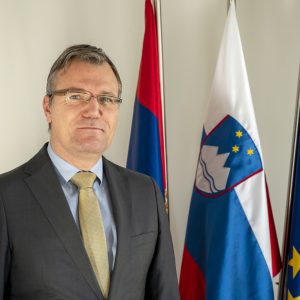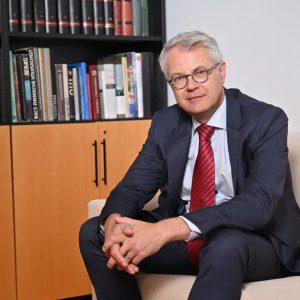
1. Your country supports Serbia on its road to the EU membership. How would you rate the reforms in Serbia and what should be the Serbian government’s priorities in the coming period?
2. Bilateral relations between our two countries are good. Where do you see the potential for improving the cooperation between Serbia and your country?

I see great potential in our economic and trade relations
1. It is a quite known that Croatia, I would say, truly and deeply supports Serbia on its European path. “Truly” because, regardless of the overall history of our relations, we want a neighbor who will be part of the European family and thus share the same values, standards and principles. “Deeply” because that is in Croatia’s strategic interest in terms of regional security and stability, especially in these times of deep and potentially far-reaching geostrategic turmoil and even competition on the European continent. We support the reform efforts of the Serbian government and we expected and advocated the opening of new negotiation chapters, as a validation of the general political commitment expressed at the Zagreb EU-Western Balkans Summit, among other things. Unfortunately, this did not happen, mainly due to the European Commission’s progress assessments but also due to the rather widespread views on the general political profile of the country. As the Ambassador of Croatia to Serbia, I cannot talk about the justification or validity of such assessments in the context of the real state of social and political life in Serbia, but I would venture to say that this confirms that choosing the European path can be a powerful, if not the most powerful tool to overcome visible and even historically inherited political dichotomies in the very fabric of society and political choices.
2. Although they are not yet, as you say, quite “good”, at least they are stable. On a daily basis we are faced with phenomena that not only do not serve to improve these relations but sometimes simply do not belong to a historical moment, i.e. the 21st century, as they are persistently recycling the paradigms of the past. That is why the aforementioned European path is so important. I would dare to say there is still a lack of awareness that the world is not reduced to Serbo-Croatian relations and that Croatia or Serbia cannot be an alibi to blow off steam for all dissatisfactions and shortcomings. At the same time, it is inadequately recognized that such approaches mainly serve to perpetuate old stereotypes in order to strengthen political positions on domestic political scenes – so renewing old idioms about Croatia is not necessarily an instrument for destroying bilateral relations, but also a means of suppressing some new idioms in Serbia. I agree with President Vučić, who recently stated that we should work on establishing “normal” relations, without radicalism in the sense of hatred or love. This can only be achieved through persistent work, a kind of silent diplomacy that will overcome both inherited issues and domestic obstacles to achieve such normalization of relations. In such a perspective, I see great potential in our economic and trade relations, in cooperation in infrastructure, in eliminating the “chains” of the past as quickly as possible by resolving inherited issues from the 1990s and, let’s not forget, the statements of solidarity which showed and validated that the majority of the society wants a step towards normal, stable, and good neighborly relations.

It is important that the region remains stable and secure
1. The region of Southeast Europe is very important for Slovenia due to political, economic, security and other elements. Slovenia and Serbia traditionally have good mutual relations, just as Slovenia has good relations with other countries in the region. The market of Southeast Europe is very important for the Slovenian economy, so it is important for us that the region remains stable and secure, because declining security has an indirect impact on Slovenia as a neighbouring country. Slovenia supports the EU enlargement to include the region and thus Serbia on its path to EU membership. Accession is a two-way process, meaning that both sides have to fulfil their tasks. The priorities of the Serbian government are focusing on reforms, and if the government is successful, I am confident that results will ensue.
2. Bilateral relations are good. Unfortunately, the COVID-19 epidemic has partially stopped the direct dynamics of political cooperation, but I am sure that after the situation improves, we will make up for everything we’ve lost. The potential for improving cooperation always exist, especially in the field of economy, but also in culture, science and other segments. Slovenia is always ready to help Serbia on its path to the EU, as a partner with knowledge and experience. We are available, and it depends on Serbia how much help it wants to accept from our side.

We shall remain supportive of Serbian EU integration
1. In terms of economic development, the Serbian record speaks for itself. During my recent, nearly five years in Serbia I have seen swift development in terms of both, infrastructure and foreign investment, including Swedish companies such as IKEA. At the same time, the internal political situation is complicated, as seen by the boycott of a large part of the opposition at the parliamentary elections last summer. The political problems, including a sometimes difficult dialogue between civil society and the government, have not been conducive to swift development of Rule of Law, an area crucial for EU enlargement. We are still waiting for constitutional reforms, and there are some puzzling cases, which puts a question mark as to the track record in terms of fighting corruption, in particular at a high level. As a consequence, the pace of progress in EU integration has been slower than expected when I arrived.
2. Now that the pandemic is about to recede thanks to emerging vaccines, we can look forward to a re-animated exchange of visits and travelers, which I believe is a pre-requisite for expanding cooperation. I expect several high-level visits from Sweden to Serbia already this year, and would hope that similar visits from Serbia to Sweden also occur. There is a lot to talk about, not least further Swedish investment in Serbia in sectors such as internet and communications, industrial production, environmental technology etc. Swedish support to Serbian reforms will continue to be some 12 mil. euros a year, in addition to the much larger support provided by Sweden via the EU. We shall remain supportive of Serbian EU integration for as long as it takes.

We have been investing efforts in promoting circular economy model
1. Finland has always been a strong supporter of the enlargement policy, since we have witnessed its benefits not only in Finland, but also in our neighborhood. We are always ready to share our know-how in this respect, and part of it is that the rule of law comes first. Serbia has made important steps on the European path, particularly in the economic sector, but it needs to invest more efforts in rule of law reforms and especially their implementation. Establishing conditions for free and fair elections and for independent judiciary are of key importance.
2. As you said, the relations between Finland and Serbia are very good, without any problems or open issues. However, the trade between the countries is still on a relatively low level, although it has been increasing from year to year. During the past few years, several Finnish companies have entered the Serbian market, either as investors or technology and service providers, especially in the clean technologies sector. The growing confidence in the stability of the Serbian market is based on ongoing reforms and EU integration process. However, there is still a lot of room for improvement, especially in the fields such as enforcement of contracts, transparency and tendering processes.
The Embassy of Finland, together with other Nordic Embassies and local partners, has been investing efforts in promoting circular economy model in Serbia. Economic growth needs to be designed as environmentally friendly because otherwise it will not be cost-effective and sustainable in the long run. The situation with Covid-19 showed us pretty well that there are issues we need to think of far ahead and work together.

The diversity and richness of our bilateral cooperation
1. The road towards European integration has had for a long time a positive effect on the reform agenda. Democratic reforms contribute to the resilience of state and society. Economic reforms foster the development of private entrepreneurship and create jobs. A well-functioning judicial system and the rule of law are important preconditions to sustain a strong economic performance. Good and friendly relations of Serbia with its neighbors, including normalization of relations between Belgrade and Pristina, will contribute to stability and prosperity of the whole region. These are important reasons for Switzerland to support Serbia on the path to EU integration, including through its development cooperation, which has amounted to around 400 Mio EUR over the past 30 years. The objective of this support is a sustainable, inclusive and innovative economy, an efficient and transparent public sector and a vibrant civil society.
2. Indeed, Serbia and Switzerland enjoy very good bilateral relations that have intensified over the last years, reflecting the diversity and richness of our bilateral cooperation in several areas. The economic development of Serbia offers an increasing potential for Swiss investments as well as for the expansion of trade in goods and services and my first objective is therefore to support the growing economic ties between our two countries. Secondly, I would like to see an increase in people to people contacts at all levels between our two countries to further underpin the good political and economic, bilateral relationship.